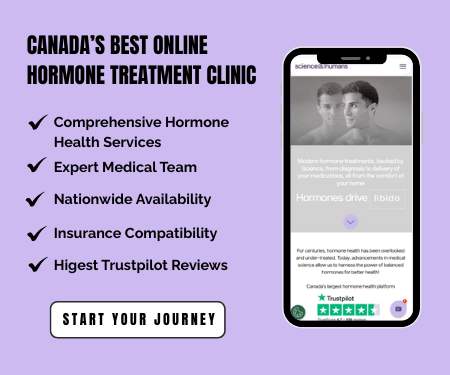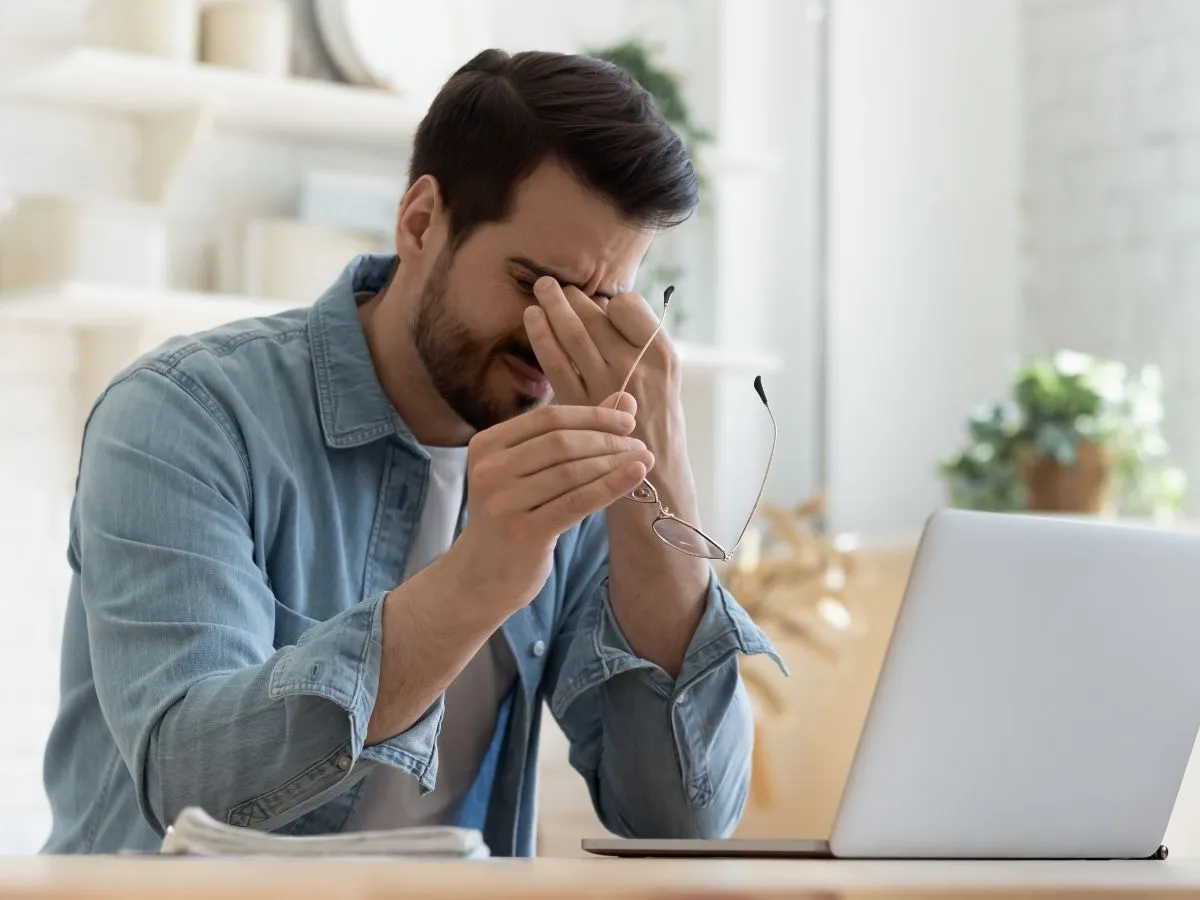Read in 30s
- Low testosterone can impact physical as well as mental well-being.
- Testosterone levels decrease with age, especially after 30 in men and after menopause in women.
- Low testosterone lifestyle factors include stress, poor diet, lack of exercise, and alcohol consumption.
- Unhealthy lifestyle can negatively affect its production.
Testosterone is a crucial hormone for both men and women. It affects everything, from our bone density and muscle mass to our libido and mood. But when its levels drop, a series of changes can occur.
Let's uncover the reasons and signs of low testosterone with awareness.
Testosterone's role in the body
Testosterone. The word makes us think of big muscles and loud voices, showing strength and dominance. But, this little molecule has more complex functions, hormone's most visible effect is undoubtedly on muscles and strength. It helps build proteins and fixes up muscles. This explains why men naturally carry more muscle mass than women, who have significantly lower testosterone levels. But beyond the gym, testosterone's influence extends to bone density , keeping our skeletons strong and resilient.
Intimacy is heavily influenced by testosterone. In men, it helps make sperm and affects sex drive. In women, it's involved in getting aroused. When testosterone levels drop, it can affect desires in both men and women.
This tiny chemical actually makes us feel calmer. It is a natural mood elevator that boosts confidence, motivation, and focus. Low levels may be linked to depression and anxiety.
Signs and symptoms of low testosterone:
symptoms can vary, these are among the most common symptoms of low testosterone.
Sex : You may not want sex as much anymore, and thinking about it might not be exciting.
Erections: Getting or keeping an erection can be harder.
Body: You might lose muscle and gain fat, especially around your belly.
Hair: Hair on your face, chest, arms, legs, and pubic area might get thinner or fall out.
Testicles: They might get smaller than they used to be.
Bones: You have a higher risk of weak bones and breaks.
Energy: You might feel tired all the time and not have much energy.
Thinking: It might be harder to focus and remember things.
Mood: You might get angry or frustrated more easily.
Sleep: You might have trouble falling asleep, staying asleep, or waking up feeling rested.
Confidence: You might feel less confident about yourself and your body.
Age Factor
Usually, younger men are highly sexually active due to high testosterone. As we get older, especially after 30, testosterone levels start to go down. This drop might be linked to changes in sex drive and differences in erectile function. The decrease could be caused by various internal mechanisms that gradually change healthy testosterone levels by age.
Decrease in healthy testosterone levels by age
The brain's small region, the hypothalamus, maintains healthy testosterone levels. It signals the pituitary gland, which communicates with testes (or ovaries in women), triggering testosterone production.
As age progresses, the communication network changes subtly. The hypothalamus signals less, weakening the pituitary's response, causing a drop in testosterone. Men see a 1-2% annual decline after 30, while women experience a sharper drop post-menopause.
The slowdown lacks a single cause but involves complex factors. In men, Leydig cells in testes decrease with age, and free testosterone diminishes, tightly binding to a protein (SHBG). This affects organs, leading to varied signs of testosterone hormone deficiency.
Hypogonadism
Hypogonadism means the gonads (ovaries or testes) don't function normally. It is an umbrella term that covers many hormonal imbalances, not just one disease. It messes up the harmony of sex hormones important for physical and mental well-being.
Due to its complex nature, diagnosing hypogonadism in male can be challenging due to overlapping symptoms with other conditions and the need for specialized tests.
In hypogonadism, the body produces less testosterone. The signals may be weak, the pituitary response slow, or the gonads might not work well, causing lower testosterone production.
Fertility challenges are common in both sexes due to the impact on egg and sperm production. Hypogonadism treatments can help with increasing sperm count and maintaining hormonal balance. Diagnosing hypogonadism involves a combination of medical history, physical examination, and laboratory tests.
Chronic Conditions Affecting Testosterone Levels:
Chronic conditions are one of the common causes of low testosterone. Some illnesses attack the testicles or ovaries, causing inflammation and hormone problems. Examples include lupus and infections like mumps or HIV. Several other conditions may mess up how the body makes and uses testosterone. Examples include obesity, diabetes, kidney and liver diseases, and HIV/AIDS.
Genetic disorders can also mess up how your body makes and uses testosterone:
Extra X Chromosome:
Having an extra X chromosome (XXY) can lower testosterone. This affects puberty, muscle growth, and fertility. Examples include Klinefelter Syndrome.
Missing X Chromosome:
Only having one X chromosome (X0) like in Turner Syndrome can lead to low hormone levels. This delays puberty, affects bone growth, and makes it hard to have babies.
Brain disorder:
A mutation in the brain called Kallmann Syndrome is also a part of testosterone disorders that can delay puberty and make it hard to conceive.
Adrenal Gland dysfunction:
Faulty genes in the adrenal glands can mess up hormone production. This can cause problems with genitals and periods.
Body Chemistry:
Some people's bodies with Androgen Insensitivity Syndrome (AIS) or other testosterone disorders can't use certain chemicals properly. This means they don't develop fully as expected during puberty.
Low hormonal activities may also be linked to chronic fatigue syndrome. Using testosterone replacement therapy or TRT for chronic illnesses is an effective method to naturally restore the chemical balance and treat the conditions. TRT for chronic illnesses is a complex and emerging field of research requiring careful consideration of potential benefits on a case-by-case basis.
Medications and Treatments
Medications meant for pain relief, chronic conditions, or mental health can lower hormonal levels. For instance, pain relievers can temporarily affect the testicles' ability to make testosterone. Also, corticosteroids, often used for inflammation, can lower both male and female hormone production.
Antidepressants might change the signals that instruct the body to make hormones. This could affect how much of each hormone is made.
Some >cancer drugs make an enzyme called aromatase more active. Aromatase changes testosterone into estrogen, a different type of hormone. So, when aromatase is more active, there's less testosterone left in the blood.
Adding “medications for low t,” along with other treatments, can address all these symptoms.
Lifestyle Factors
Testosterone hormone deficiency isn't always the body's fault. Sometimes, there are other causes of low testosterone. Living an unhealthy lifestyle directly invites low testosterone levels. Here's how:
Stress
Constant stress messes with hormones. When you face ongoing mental or physical demands, the body boosts cortisol. This hormone, vital for stress coping, acts against testosterone, holding back its creation in testes' Leydig cells. So, ongoing stress can result in consistently low testosterone levels, showing up as less interest in sex, lower energy, and even muscle loss.
Diet
Your diet influences your body. Consuming processed foods, refined carbs, and unhealthy fats disrupts the metabolism. This can result in high blood sugar and resistance to insulin and impact the gonadal function. Additionally, not getting sufficient essential micronutrients like zinc and vitamin D worsens the situation.
Lack of exercise
Regular physical activity boosts testosterone. Lifting weights triggers Leydig cells to make testosterone by releasing luteinizing hormone (LH). Being inactive decreases LH and causes hormonal imbalance.
Alcohol
Drinking a bit may not affect testosterone much, but drinking too much can be bad. Alcohol messes up the brain function, making more cortisol and lowering testosterone. Too much alcohol can also directly hurt Leydig cells, making less testosterone. It may also cause hypogonadism in male.
Natural ways to boost testosterone
Now that we understand the lifestyle factors that can influence hormonal balances, it's time to take action! Simple things can help in treating low testosterone in males and females:
- Stress lowers testosterone. Relaxing with yoga, meditation, or nature walks can help.
- Choose fruits, veggies, whole grains, and lean protein for balanced fuel.
- Lift weights! Strength training is like a tune-up for your engine, boosting testosterone.
- Enjoy alcohol in moderation, but stick to water and healthy drinks most of the time.
- Aim for 7-8 hours of sleep each night to let your body naturally regulate testosterone.
Low testosterone lifestyle factors are multifaceted. Make these changes in daily life to make your body free from the symptoms. If things don't balance out or symptoms persist, you might need medical help for low testosterone treatment. Several treatments like hormone replacement therapy are tailored to suit individual needs and aim to bring the testosterone levels into balance.
Frequently asked questions:
Q. Are my testosterone levels low?
A. Symptoms like low libido, erectile dysfunction, chronic fatigue syndrome, muscle loss, and mood changes can be suggestive of low testosterone.
Q. Is testosterone present in females?
A. Yes, it is present in both men and women. In women, it is in low amounts and includes functions like controlling bone density, sex drive, and mood.
Q. Does it have a link with heart health?
A. Suggests a complex relationship between testosterone and heart health. While high testosterone levels might be associated with an increased risk of certain cardiovascular issues, low levels may also raise risks.
Q. Does Testosterone affect sperm count?
A. Yes, it plays a vital role in sperm production. Low levels can lead to reduced sperm count and motility. However, hypogonadism treatments like testosterone replacement can also potentially increase sperm count.
Q. Are testosterone pills safe?
A. Oral medications for low t are a common measure in treating low testosterone in males. However, like any medication, it can have potential side effects and risks. They should only be used under the supervision of a doctor. Never self-medicate as it can be harmful.
Q. How to treat low testosterone?
A. Low testosterone treatment depends on the cause, typically involving lifestyle changes, medications, or TRT (Testosterone Replacement Therapy) under medical supervision.
References
|




